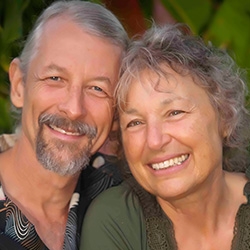

Search Results: expression
-
Miki Kashtan helps you move past fear and build skill in making clear, confident requests.
-
Welcome to the final video in our 3 part Embodied NVC Life Hack series. So far we've learnt about rewiring our brain from a flight, fright or freeze reaction to the choice of self-empathy, allowing us to centre and check-in with ourselves. In part two, Empathy Skills, we went beyond self-empathy to look at ways we can empathise with the other person. In this final instalment, we create a bridge from empathising to expressing.
-
Trainer tip: Beware that your expression of feelings helps you own how you feel, rather than blaming the other person for doing something you see as wrong. Expressing your feelings helps the other person know how deeply this issue affects you. Plus it can bring more clarity and connection to all parties. Read on for more.
-
One of the premises in NVC is that behind all behavior and expressions are Universal Human Needs as the deeper motivators. And one of the key distinctions in NVC is that between Needs and Strategies. Try Alan Rafael Seid's exercise called "Peeling the Layers of the Onion, " a process for uncovering these needs — the deeper motivations — that underlie words and behaviors we may find disturbing or puzzling.
-
Building your body and mind awareness can help you better regulate/calm your emotions. Regular self-empathy will help you better regulate your emotions as well as increase your body and mind awareness. If you are not aware of amygdala activation (fight/flight/freeze response), you will react instead of responding with choice. Use this eight-step process to develop your self-empathy/regulation skills.
-
Recently, I have been pondering anger, how I express it and the jackal story I tell myself about it. Marshall Rosenberg taught that anger is a natural emotion that is based on a judgment of someone else or myself. I agree with this, so I have been doing some “enemy images” and self-empathy work (and praying for those who are most likely to be the recipients of my anger). My goal was to clear my judgments and take responsibility for my “stuff.” It has helped a lot, and yet I still feel a general anger in me that is not directly related to anyone or any specific situation.
-
Ingrid guides parents to navigate everyday parenting challenges using the NVC model, such as the behavior of a frustrated child, a messy room, transition times and a child who collapses when things don't work out as she had hoped.
-
Discover a simpler way to ask “Would you tell me what you heard me say?” in NVC.
-
In general, criticism is a reactive response discomfort. When someone criticizes, they are not yet able or willing take responsibility for their needs. All criticism is a tragic expression of feelings and unmet needs. When you meet that criticism skillfully you not only care for yourself, you can facilitate clarity, and constructive communication, about what the other person is truly asking for.
-
Sylvia Haskvitz shares NVC basics to help you improve understanding and connection.
-
Shift from cerebral empathy to intuitive listening—tune into body cues and inner feelings.
-
Honor the wisdom in your BIG emotions as you are guided through anger, fear, and shame with NVC.
-
From the depths of internal winter to the melting open in the warm sunshine of spring to rest in the ocean of Spirit, this poetry is a journey of discovering deep Presence through the human experiences so many of us share.
-
Reflect on a time when you were either expressing gossip or participating passively. What feelings and needs were up for you at the time? How might you have interrupted the gossip with connection? When interrupting gossip it can take a few rounds of empathy and honest expression to bridge understanding, and create a space in which mutual care and curiosity arises. Read on for an example.
-
How can we express ourselves in a way that supports a natural flow of connection while maintaining a focus on NVC consciousness? This handout from CNVC Certified Trainer, Miki Kashtan, offers seven options that support NVC enthusiasts in evolving from classical to colloquial NVC language.
-
Use NVC and mediation tools to transform conflict into authentic connection.
-
Trainer Tip: Anger can be an opportunity to hear the "Please" behind the words and create a path to resolve conflicts compassionately.
-
Explore NVC's role in transforming power dynamics and bridging social divides.
-
Explore joy through gratitude with Kathleen—stay present even amid life’s challenges.
-
Trainer Tip: Ready to start a fight because you're right? Consider another strategy.
Quick Links

Stay in Touch!
We value your privacy, won't share your email address and you can easily unsubscribe any time.



















